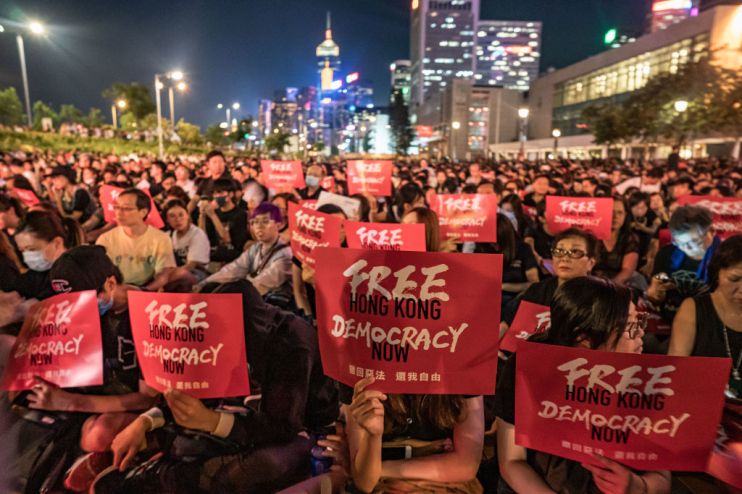China has failed to live up to its promise to Hong Kong, but Britain must not follow

When Chris Patten, the last British governor of Hong Kong, bowed out of the territory for the last time at midnight on July 1, 1997, he departed with the hopeful promise that “now, Hong Kong people are to run Hong Kong.”
Twenty-five years later, that dream has been irrevocably dashed by the Chinese Communist Party (CCP) and its brutal actions.
Despite a historic pledge to respect Hong Kong’s “high degree of autonomy” for 50 years following Britain’s return of the territory in 1997, Beijing has systematically breached its commitments to Hong Kong’s freedoms under the legally-binding Sino-British Joint Declaration.
Signed by China and the UK in 1984, the Declaration sought to safeguard Hong Kong’s political, economic, and social fabric under the “one country, two systems” principle.
However, through its imposition of the national security law (NSL) in June 2020 in response to the city’s widespread pro-democracy movement, Beijing has instigated a totalitarian takeover of Hong Kong, marked by fear and repression.
Punishable by up to life imprisonment, the sweeping, draconian security legislation has criminalised dissent and curbed freedoms of expression, assembly and the press under the guise of restoring stability.
The repressive law has been used to lock up most of Hong Kong’s political opposition, including 53 of the city’s most prominent pro-democracy politicians and activists, while many have been forced to flee the city for fear of their safety.
Determined to crush its critics, the Beijing-backed regime in Hong Kong has demolished press freedoms. Independent, free-thinking media, including Apple Daily, Stand News, and Citizen News have ceased to exist following relentless intimidation and the mass arrests of journalists and executives.
Once famed for its uncompromising debate and defiance, Hong Kong’s civil society, too, has fallen silent in the wake of the security law. Dozens of organisations, including unions, rights defenders, student groups, and religious networks, have been shuttered in the wholesale crackdown on dissent.
Dissatisfied with its dismemberment of Hong Kong’s society, Beijing has also overhauled Hong Kong’s legislature to mirror its own rubber-stamp parliament. Imposed last year, its “patriot only” reforms have ensured that Hong Kong’s parliament is packed only with vetted loyalists, ending the city’s decades-long tradition of political pluralism and free and fair elections.
These changes have since paved the way for Beijing to install its favoured brute and former security tsar, John Lee, as the city’s new Chief Executive. Key to crushing the city’s democracy protests as security chief in 2019, Lee’s disgraceful appointment only tightens Beijing’s grip over Hong Kong.
And yet, despite Beijing’s unrelenting attacks on Hong Kong’s way of life, Britain, as the sworn defender of Hong Kong’s autonomy, has failed to act decisively in defence of its diminishing freedoms.
Britain still leads the world as a model democracy and hub of human rights and the rule of law. Therefore, the British Government should not hesitate to use the tools it has to bring Beijing back in line and hold China to account for its treaty obligations.
China has long since made clear that it cares little for the UK Government’s occasional, strongly-worded rebuke over its rights abuses in Hong Kong.
The Government must therefore impose more severe measures, as it has rightly done in response to Beijing’s genocide of the Uyghurs and other minorities in Xinjiang. These must include targeted, economic and diplomatic sanctions, such as asset freezes and travel bans, on Chinese and Hong Kong officials guilty of destroying the city’s rights and freedoms.
On the 25th anniversary of the handover, it is all too clear that China has failed to live up to its promise to Hong Kong. Britain must not. We must abide by our historic responsibility and stand with Hong Kong.
